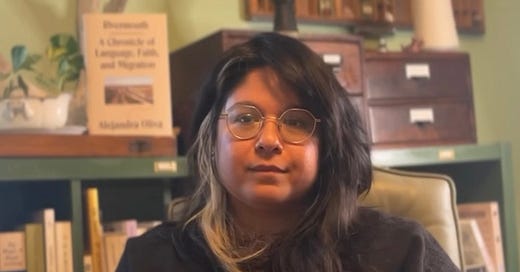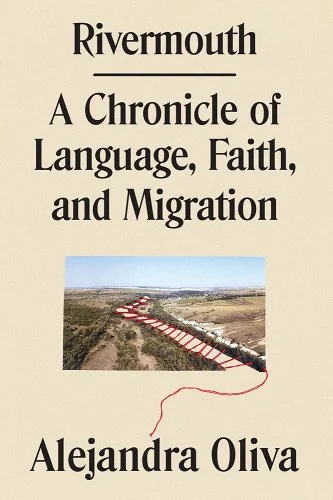"Stories are important—but they’re also not enough."
with Alejandra Oliva author of 'Rivermouth: A Chronicle of Language, Faith, and Migration'
#NuevasPaginas is a space that aims to amplify and spotlight Hispanic/Latine/x authors with newly published books. The goal is to connect readers to their next favorite Hispanic/Latine/x authored book through a mini casual get-to-know-the-book-and-author interview. So give please spread the news so we can reach more readers and continue the love/support of Latine literature!
Hey Book Franz!
In this week’s issue, we get to celebrate a book birthday! This is a special book birthday for me because we are celebrating one of my favorite books of the year! Yes, I am aware that there’s still plenty of time left in the year to read more books and discover more favorites. That said, 'Rivermouth: A Chronicle of Language, Faith and Migration’ will remain at the top of the list. I read ‘Rivermouth’, last month and found it to be such a profound read, not just because of the topics it covers — it chronicles the author’s experience with being an interpreter for migrants seeking asylum in the U.S., weaving in some of their stories. The book also left me with so many questions. I don’t know if you all know this about me, but I love a book that fills me with questions.
In ‘Rivermouth’, Olivia navigates the limits of translation and storytelling. Beyond that, she navigates privilege and the delicate balance it takes to not only show up for each other but how do we amplify those that need to be heard without capitalizing off their stories and speaking over them. It’s such a powerful book and it’s one I hope everyone will read this year. If not this year, definitely make it one you need to read in this lifetime.
What is Lupita reading this week?
WE ARE BOOK CLUBBING?! Or did you forget? Because I know I have been a terrible book club leader but we are doing it! So this week is devoted entirely to finishing ‘The Consequences’ by Manuel Muñoz. I’ll be dropping a series of questions to help us talk about this stunning set of stories next Thursday, June 29th. I know I keep saying this but it’s really not too late to still join in on the fun.
Without further ado, our special guest author for today’s Nuevas Pagina issue is……Alejandra Oliva author of Rivermouth: A Chronicle of Language, Faith, and Migration!
Could you tell me a bit about where this photo was taken? Is it special to your book in some way?
This photo was taken in my office at home—I moved into this house right around the time I was finishing RIVERMOUTH, so it’s not necessarily The Room Where It Happened, but I really love that space and the ability it’s given me to have room for creating and writing. The photo is actually a screenshot of an explainer vids I made for Astra House, my publisher, and so I’m about to start talking VERY animatedly about immigration news, policy, and people, which is kind of my default state these days.
Tell me about your book without telling me about your book - share any literary inspirations behind your book! If there are none, the gap you wanted to fill in the literary canon with your book
There are so many inspirations—I think the first and most obvious one is Valeria Luiselli’s Tell Me How It Ends, which was honestly both a literary and a life inspiration. Reading it was the catalyst for getting me involved in the immigration justice world and activism, for turning this thing I kind of knew about abstractly into a concrete issue, happening in the city around me, and that I had skills and the ability to do something to help. Beyond that, Kate Briggs’ This Little Art was the first book I read that treated (literary) translation as something that was both serious and interesting but also could be playful and fun and absorbing and deeply emotional
What are two central themes in your book that you connect with the most and why?
The two themes that feel both the most powerful and the most personal somehow is that stories are important, but also that stories aren’t enough. I think these two ideas, and the tension between them, have influenced so much of my life, my writing, my career. Stories are important—the way people choose to talk about themselves and the world around them can literally shift opinions and eventually reality. This especially rang true to me while working with asylum seekers, who, as part of their application, need to tell really specific stories about themselves and their experiences in order to be considered eligible, and these stories are, to say the least, not respected.
That feels like such an addition of violence and trauma to people who have, pretty much by definition, been through an incredible amount of violence and trauma. Spending time with these folks, listening to them and the political opinions that grew from their experiences changed my life and radicalized me in a way that pretty directly led to Rivermouth. Stories are important—but they’re also not enough. Stories can’t be transformational until or unless we follow them up with action and intention and movement in the world, outside the pages of a book or an internet browser. To keep going with the earlier example—the stories that asylum seekers tell are just stories on a government form until they’re granted asylum, start being able to process their trauma, get work permits, become parts of their new communities.
If a book was home, where would your home be?
I feel like it’s a little bit of a cop out to say that RIVERMOUTH would be my house, but I think it’s true. The book is about immigration and the right to free movement, but I think what the book more strongly argues for is the right to build and create a home in a place that feels safe and comforting and good. I moved into my current house right around the time I finished RIVERMOUTH, and did a lot of reflecting on what it means or looks like to make a home, to find and build out a space for yourself to grow, and how that should be a human right.
If your book was a famous musician who would it be?
Part of my book makes reference to an Antonio Machado Poem, but the truth is that like a lot of people, I first discovered that song through a Joan Manuel Serrat song, “Cantares.” Serrat is a musician from Catalunya who spent years in Mexico as a political exile after criticizing the Francoist government, and the song speaks to the pain of exile and the hardships of the road.
What comfort food could a reader pair with your book?
Quesadillas with craisins. This was a culinary innovation pioneered by my siblings and I, growing up in New England, and honestly, it still slaps. Peak salty-sweet combo, plus the tartness of the dried cranberries kind of cutting the rich creaminess of the melted cheese, plus crispy tortilla is a texture/flavor dream. Also about as child-of-Mexican-immigrants-living-in-Massachusetts as you can get, thematically (which is also what Rivermouth is and advocates for).
In what ways has access (or little to no access) to Hispanic/Latinx/e literature defined you as a writer?
Before moving to the U.S. my mom was a Spanish composition professor in Mexico, and they always felt it was important to keep a lot of books in the house in both English and Spanish. I read a lot of the classics in middle and high school (always in the original Spanish, at their insistence). I am a little less of a voracious reader in Spanish, but I try to do as much as I can. I think that having this insistence on being bilingual not just in a communications way but in my reading is part of what made me so fascinated with translation and being a writer.
Where can readers keep up with your work?
I’m on Twitter (too often!) at @olivalejandra_, on IG at @olivalejandra, and my website is olivalejandra.com
Thank you to Alejandra Oliva for taking the time to chat with me about her book! Please please make sure you purchase a copy (or request your local library carry a copy) #SupportLatinxLit!
Alejandra Oliva is an essayist, translator, immigrant justice advocate, and embroiderer. She is a recipient of the 2022 Creative Nonfiction Whiting Grant. Her writing has been included in Best American Travel Writing 2020, was nominated for a Pushcart prize, and was honored with an Aspen Summer Words Emerging Writers Fellowship. She was the Frankie Fellow at the Yale Whitney Hummanities Center in 2022. Read more at olivalejandra.com.
Synopsis for ‘Rivermouth: A Chronicle of Language, Faith, and Migration’ from the Bookshop website:
In this powerful and deeply felt memoir of translation, storytelling, and borders, Alejandra Oliva, a Mexican-American translator and immigrant justice activist, offers a powerful chronical of her experience interpreting at the US-Mexico border.
Having worked with asylum seekers since 2016, she knows all too well the gravity of taking someone's trauma and delivering it to the warped demands of the U.S. immigration system. As Oliva's stunning prose recounts the stories of the people she's met through her work, she also traces her family's long and fluid relationship to the border--each generation born on opposite sides of the Rio Grande.
In Rivermouth, Oliva focuses on the physical spaces that make up different phases of immigration, looking at how language and opportunity move through each of them: from the river as the waterway that separates the U.S. and Mexico, to the table as the place over which Oliva prepares asylum seekers for their Credible Fear Interviews, and finally, to the wall as the behemoth imposition that runs along America's southernmost border.
With lush prose and perceptive insight, Oliva encourages readers to approach the painful questions that this crisis poses with equal parts critique and compassion. By which metrics are we measuring who "deserves" American citizenship? What is the point of humanitarian systems that distribute aid conditionally? What do we owe to our most disenfranchised?
As investigative and analytical as she is meditative and introspective, sharp as she is lyrical, and incisive as she is compassionate, seasoned interpreter Alejandra Oliva argues for a better world while guiding us through the suffering that makes the fight necessary and the joy that makes it worth fighting for.









Love this so much!